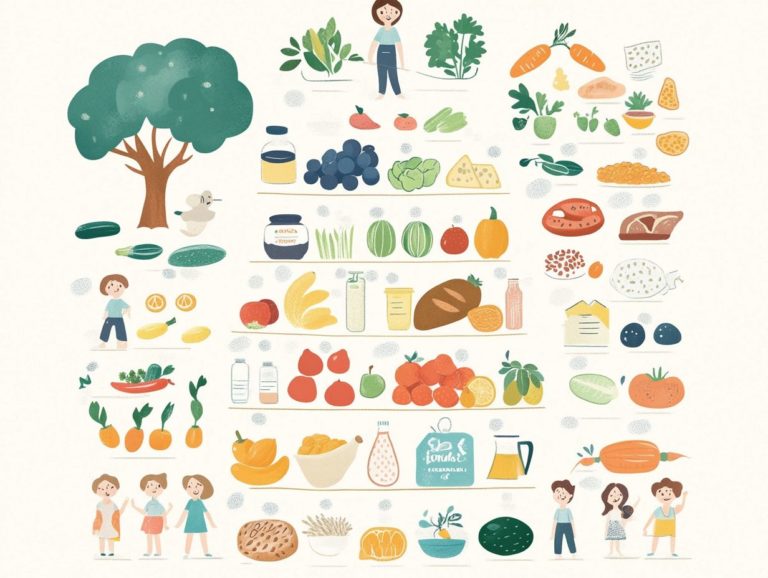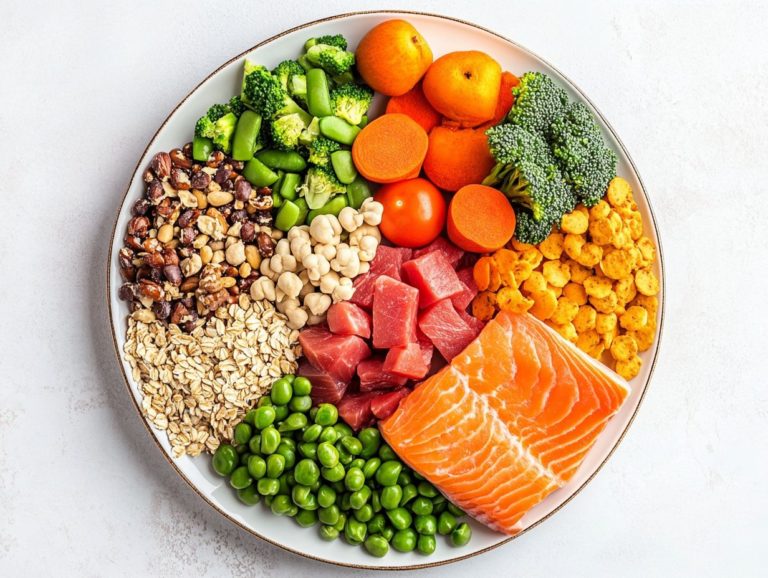Top 7 Resources for Dietary Guidelines Education
Navigating the world of nutrition can feel like a daunting task, especially with the overwhelming amount of information at your fingertips. Understanding dietary guidelines is essential for making informed choices about your health, preventing long-term health issues, and cultivating a balanced lifestyle.
Let s explore seven invaluable resources ranging from government websites to professional organizations that offer profound insights into dietary recommendations. It also tackles common misconceptions, highlights key components of a healthy diet, and provides practical tips for seamlessly integrating these guidelines into your daily routine.
Embrace the opportunity to take charge of your nutrition journey!
Contents
- Key Takeaways:
- 1. The USDA Dietary Guidelines Website
- 2. The MyPlate Website
- 3. The American Heart Association Website
- 4. The Academy of Nutrition and Dietetics Website
- 5. The World Health Organization Website
- 6. The Centers for Disease Control and Prevention Website
- 7. Registered Dietitians and Nutritionists
- Why Is It Important to Educate Yourself on Dietary Guidelines?
- What Are the Key Components of a Healthy Diet?
- How Can Dietary Guidelines Help with Disease Prevention?
- What Are the Common Misconceptions About Dietary Guidelines?
- How Can One Incorporate Dietary Guidelines into Their Daily Life?
- What Are the Potential Risks of Not Following Dietary Guidelines?
- How Can One Stay Up-to-Date with Changes in Dietary Guidelines?
- Frequently Asked Questions
- What are the top 7 resources for dietary guidelines education?
- Why is it important to educate ourselves about dietary guidelines?
- Are there interactive resources for dietary guidelines education?
- Are there resources for specific dietary needs or preferences?
- Can I trust the information from these resources?
- Are there resources specifically for children’s dietary guidelines education?
Key Takeaways:

The USDA Dietary Guidelines website provides evidence-based recommendations for a healthy diet.
The MyPlate website offers personalized tools and resources to help individuals make healthier food choices.
Registered Dietitians and Nutritionists can provide individualized education and support for following dietary guidelines.
1. The USDA Dietary Guidelines Website
The USDA Dietary Guidelines Website is an invaluable resource for those seeking to understand the Dietary Guidelines for Americans, established by the U.S. Department of Agriculture and the U.S. Department of Health and Human Services. It promotes healthy eating patterns and nutrition education to enhance public health and lower the risks of chronic diseases through mindful choices and balanced diets.
By providing a treasure trove of dietary information, the website empowers you and your family with essential tools for effective meal planning. You ll find practical resources at your fingertips, whether you’re searching for recipes that align with dietary recommendations or seeking expert guidance on appropriate portion sizes.
This platform helps you understand the science behind nutrition, allowing you to deepen your understanding of how different foods contribute to overall health. As a centralized hub, it not only serves as an informational resource but also acts as a supportive tool, encouraging you to adopt positive lifestyle changes for better long-term health outcomes.
2. The MyPlate Website
The MyPlate website serves as your personal guide to understanding food groups, helping you grasp portion control while emphasizing the importance of healthy fats, fruits, vegetables, whole grains, and protein in crafting a balanced diet.
This resource takes the guesswork out of meal planning, allowing you to easily visualize your plate and quickly identify your nutritional needs. By demonstrating how to fill half your plate with vibrant fruits and vegetables, it inspires you to embrace a colorful and varied selection of foods.
To seamlessly incorporate MyPlate into your daily routine, start by evaluating your current meals. Consider swapping out less healthy choices for whole grains or plant-based proteins. Preparing meals in advance while adhering to MyPlate principles empowers you to make smarter, healthier decisions throughout the week.
3. The American Heart Association Website
The American Heart Association website stands as a vital resource for you, promoting healthy eating habits to effectively combat heart disease and other chronic conditions. It offers comprehensive guidelines and resources designed to support your journey toward a heart-healthy lifestyle.
Within this treasure trove of information, you ll discover an extensive collection of heart-healthy recipes that transform wholesome eating into a delightful and attainable experience. These nutritious meals are carefully crafted to minimize added sugars and unhealthy fats, delivering both energy and flavor without sacrificing your health.
The site also provides insightful meal planning tips that empower you to thoughtfully organize your weekly menus, making it easier to choose heart-smart options. By prioritizing practical guidelines and expert advice, the American Heart Association equips you to navigate your dietary decisions with confidence, encouraging a proactive approach to maintaining your cardiovascular wellness.
Start exploring these resources today for a healthier you!
4. The Academy of Nutrition and Dietetics Website
The Academy of Nutrition and Dietetics Website serves as a rich resource, offering insights directly from registered dietitians. Here, you ll find valuable information on nutrition education, health education, and practical strategies to enhance your healthy eating habits.
This platform is more than just a collection of facts; it presents a diverse range of educational resources designed to cater to the unique needs of various audiences. You can access comprehensive nutrition-related curricula suitable for schools or community programs, empowering you to make informed dietary choices.
The website provides practical tips for meal preparation, making healthy cooking not only accessible but also a delightful experience.
By emphasizing the essential role dietitians play in promoting healthy eating habits, this resource deepens your understanding of nutrition and wellness. It enriches the community as a whole.
5. The World Health Organization Website

The World Health Organization website offers global dietary recommendations designed to promote health and prevent chronic diseases. It highlights the significance of nutritious diets and healthy eating habits across the globe.
By marrying scientific research with an appreciation for diverse cultural practices, these guidelines advocate for a complete view of nutrition. They respect local diets while championing health, recognizing that cultural factors play a significant role in food choices and eating habits in various regions.
On a personal level, you can interpret these guidelines to enhance your daily meals, considering not just your health needs but also your cultural preferences. Embracing this adaptable framework encourages a sustainable approach to healthy eating, ensuring that dietary recommendations remain practical and relevant to your unique lifestyle.
6. The Centers for Disease Control and Prevention Website
The Centers for Disease Control and Prevention (CDC) website is essential in tackling the obesity epidemic, offering a treasure trove of nutrition education, resources, and health promotion strategies crafted to inspire healthier lifestyles.
This platform is a comprehensive resource, presenting you with a wealth of information, from detailed statistics on obesity rates across various demographics to effective health education initiatives tailored for diverse audiences.
You ll discover practical tips on achieving a balanced diet that emphasizes whole foods while also learning the art of maintaining optimal hydration levels.
By equipping you with the necessary knowledge, the CDC empowers you to make informed decisions about your health, ultimately playing a vital role in the collective effort to combat obesity and enhance overall well-being.
7. Registered Dietitians and Nutritionists
Registered dietitians and nutritionists are invaluable partners in your journey toward optimal nutrition, offering tailored guidance on healthy eating, meal planning, and effective cooking habits that meet your unique dietary needs.
These professionals are pivotal in health education, providing you with the insights necessary to make informed food choices that align with your personal health goals.
By evaluating your specific dietary requirements, they craft customized nutrition plans that consider your preferences, cultural background, and any medical conditions you may have. This personalized strategy enhances your ability to follow dietary guidelines.
With their expertise, registered dietitians help translate complex dietary recommendations into practical steps, enabling you to cultivate healthier habits and elevate your overall well-being.
Start your journey with a registered dietitian today and unlock the secrets to better health!
Why Is It Important to Educate Yourself on Dietary Guidelines?
Educating yourself on dietary guidelines is crucial for making informed food choices. This knowledge promotes healthy eating, prevents chronic diseases, and enhances your overall well-being through effective meal planning and a clear understanding of your nutritional needs.
Understanding these guidelines helps you appreciate the importance of incorporating various foods into your diet. This ensures you receive essential nutrients and supports not just your physical health but also uplifts your mental well-being. Good nutrition is closely connected to improved mood and cognitive function.
When you are well-informed about your dietary choices, you empower yourself to resist fad diets and make sustainable, healthy decisions instead. A strong foundation in nutrition education fosters a proactive attitude toward your health, helping you mitigate risks associated with conditions like diabetes, heart disease, and obesity.
What Are the Key Components of a Healthy Diet?
A healthy diet integrates essential components like fruits, vegetables, whole grains, and protein sources. These elements are vital for meeting your nutrient needs and supporting your overall well-being.
Each food group plays a unique role in maintaining bodily functions and enhancing wellness. For example, fruits and vegetables are rich in vitamins, minerals, and antioxidants substances that help fight cell damage. They can elevate your immunity and reduce the risk of chronic diseases.
Whole grains provide dietary fiber, aiding digestion and helping you maintain a healthy weight. Protein sources, whether animal-based or plant-based, are crucial for muscle repair and growth.
To easily incorporate these foods into your daily meals, try:
- Colorful salads with seasonal produce
- Hearty grain bowls topped with lean proteins
- Smoothies that blend various fruits and leafy greens
This approach ensures you enjoy a balanced and nutritious intake throughout the week.
How Can Dietary Guidelines Help with Disease Prevention?

Dietary guidelines are essential for disease prevention. They promote healthful eating habits that significantly reduce the risk of chronic conditions like obesity, diabetes, and heart disease through effective nutrition education. By emphasizing balanced diets that include various food groups, these guidelines provide a clear roadmap to enhance your well-being.
Following these recommendations aids in weight management and supports your immune system while boosting energy levels. Try these easy strategies to make healthy eating a breeze:
- Meal prepping to save time and reduce stress
- Learning about food labels
- Making simple swaps, like choosing whole grains over refined grains
Practice mindful eating to increase your awareness of hunger cues, leading to healthier food choices overall.
What Are the Common Misconceptions About Dietary Guidelines?
Common misconceptions about dietary guidelines often stem from misunderstandings of healthy eating principles and nutrition science. These myths can create confusion and prevent you from adopting habits that genuinely support your well-being.
For instance, you might think all fats should be avoided. This overlooks the critical distinction between saturated and unsaturated fats. Eliminating healthy fats from avocados, nuts, and olive oil can be detrimental to your overall health.
Similarly, misunderstandings about carbohydrates lead to the erroneous belief that they cause weight gain, ignoring the benefits of whole grains and fiber-rich fruits and vegetables. By clarifying these misconceptions, you can gain a deeper understanding of the guidelines that empower you to make informed dietary choices aimed at enhancing your health.
Unlearn these myths and empower your health today!
How Can One Incorporate Dietary Guidelines into Their Daily Life?
Incorporating dietary guidelines into your daily life is entirely achievable with a bit of strategic meal planning, an understanding of portion sizes, and the adoption of healthy cooking habits that promote balanced nutrition.
By dedicating time to prepare meals in advance, you ll always have nutritious options ready to grab, steering clear of last-minute unhealthy choices that often derail your efforts.
Effectively utilizing nutrition labels is essential. They provide valuable insights into ingredients and calorie content, giving you the power to make informed choices during your grocery shopping.
Focus on whole grains, lean proteins, and colorful fruits and vegetables. This will significantly bolster your personal health goals.
Developing a habit of preparing simple dishes that incorporate these wholesome ingredients can streamline the process, making healthy eating not just a goal but a sustainable lifestyle.
What Are the Potential Risks of Not Following Dietary Guidelines?
Not adhering to dietary guidelines can expose you to significant health risks, such as a heightened vulnerability to long-lasting illnesses that can affect your health, like heart disease or diabetes, obesity, and deficiencies in essential nutrients. This highlights the critical need for proper nutrition education.
When you frequently indulge in processed foods laden with sugars and unhealthy fats, you may find yourself not only gaining weight but also grappling with elevated blood pressure and cholesterol levels. This can create a relentless cycle of health issues that s hard to break.
Neglecting these dietary guidelines often leads to inflammation, fatigue, and a compromised immune response, making you more susceptible to infections.
Overlooking the importance of balanced meals can hinder cognitive function, affecting everything from your memory to your emotional stability.
Therefore, it s essential to make informed food choices that nurture your body, paving the way for long-term wellness and vitality.
How Can One Stay Up-to-Date with Changes in Dietary Guidelines?
Staying current with changes in dietary guidelines is essential for making informed food choices. You can achieve this through reliable government resources, health education programs, and continuous nutrition education.
To effectively navigate the latest updates, explore reputable government websites like the USDA and the CDC, which regularly publish comprehensive resources.
Subscribing to nutrition newsletters from organizations such as the Academy of Nutrition and Dietetics will keep you in the loop with timely insights and expert recommendations tailored to your specific dietary needs.
Engaging with professional organizations gives you access to cutting-edge research, workshops, and courses that deepen your understanding of nutrition science, ultimately supporting your journey toward better health and more optimal dietary practices.
Frequently Asked Questions

What are the top 7 resources for dietary guidelines education?
- Dietary Guidelines for Americans: This is the official document released every 5 years by the US Department of Agriculture (USDA) and the Department of Health and Human Services (HHS) to provide evidence-based dietary recommendations for Americans.
- MyPlate: Developed by the USDA, MyPlate is a visual representation of the 5 food groups that make up a healthy diet and serves as a helpful guide for meal planning.
- ChooseMyPlate.gov: This website provides a wide range of resources and tools to help individuals and families make healthy food and lifestyle choices based on the Dietary Guidelines.
- Nutrition.gov: A government website managed by the USDA that provides reliable information on nutrition, healthy eating, and physical activity.
- American Heart Association: This non-profit organization offers a variety of resources, including recipes and educational materials, to promote heart-healthy eating based on the Dietary Guidelines.
- Academy of Nutrition and Dietetics: The world’s largest organization of food and nutrition professionals, this academy provides evidence-based nutrition guidance and resources for individuals and healthcare professionals.
- Local Health Departments: Your local health department may offer free or low-cost nutrition education programs and resources based on the Dietary Guidelines.
Start your journey to better health today! Explore these resources and make a positive change.
Why is it important to educate ourselves about dietary guidelines?
Understanding dietary guidelines helps us make better food choices. This knowledge promotes our health and reduces the risk of chronic diseases.
Are there interactive resources for dietary guidelines education?
Yes! Here are some helpful tools:
- MyPlate Plan: Create personalized daily food plans based on your age, sex, height, weight, and activity level.
- SuperTracker: Track your food and activity while receiving tailored nutrition advice.
- Food-A-Pedia: Search for nutrition facts on thousands of foods and see how they compare to daily recommendations.
Are there resources for specific dietary needs or preferences?
Absolutely! Here are a few:
- Vegetarian Resource Group: Offers meal planning ideas and recipes for vegetarians and vegans.
- National Celiac Association: Provides resources for those with celiac disease or gluten intolerance.
- American Diabetes Association: Offers educational tools and meal planning guidance for individuals with diabetes.
Can I trust the information from these resources?
Yes, these resources are based on the latest Dietary Guidelines for Americans. Always check the publication date to ensure the information is current and reliable.
Are there resources specifically for children’s dietary guidelines education?
Yes, there are great resources for children:
- Team Nutrition: Promotes healthy eating and activity for kids in schools.
- Kids Eat Right: Provides tips for parents to help kids develop healthy eating habits.
- EatRight.org: Offers fun games and educational materials about nutrition for kids and teens.






